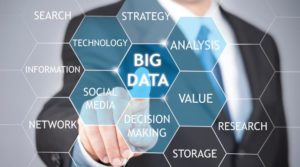Table of Contents
Welcome to an insightful examination of ethical issues in the field of big data marketing, dear reader. Consumer data has become a useful resource for companies looking to understand and serve the demands of their customers in the modern digital environment. Big data analytics has created new opportunities for marketers by making a wealth of information readily available. This has allowed them to hone their tactics and produce outstanding outcomes.
It is crucial to stress the relevance of responsible data use as we set out on this path. It is essential to strike a delicate balance between utilizing the potential of big data and respecting the ethical restrictions that surround its use in a world where privacy concerns are of utmost importance.
Amidst the discussion of ethical implications, it is worth mentioning that choosing the right data migration company plays a crucial role. Such companies ensure the secure and seamless transfer of data, respecting privacy and protecting sensitive information. Let us now delve deeper into the world of big data and understand its various dimensions.
Grasping the Concept of Big Data
To get started, we must first explore the essence of what big data actually encompasses. Big data is most simply defined as an enormous amount of data that has been gathered from numerous digital platforms and channels. Volume, Velocity, and Variety—commonly referred to as the three “Vs” in the big data world—can be used to summarize the core of big data.

Volume: Signifies the sheer quantity of data that is generated and collated. The ever-increasing number of devices connected to the Internet and the widespread digitization of procedures result in data being produced at an unrivaled scale.
Velocity: Alludes to the speed at which data is created and necessitates processing. The instantaneousness of digital interactions calls for swift analysis and prompt decision-making.
Variety: Encompasses an extensive array of data types and formats. Big data comprises structured, semi-structured, and unstructured data, each posing distinct challenges and unveiling unique prospects.
For a more detailed exploration of big data, consider referring to the extensive resources available through the International Data Corporation (IDC). As a leading authority in technology research and analysis, IDC provides a rich source of information on big data for those who wish to delve deeper into the subject.
Main Benefits of Using Big Data in Marketing
Big Data’s application in marketing goes beyond raw data collection and analysis. It provides key insights that can enhance various aspects of a company’s marketing strategy.
Increase Customer Engagement
The Next Best Action (NBA) approach exemplifies Big Data’s power in customer engagement. NBA leverages real-time decision-making technology and Big Data analytics to determine suitable offers for customers at the moment of interaction. By monitoring events in real-time and embedding insights into decision-making processes, companies can provide personalized and dynamic recommendations across various channels.
Personalize Advertising and Offerings

The advent of Big Data has brought a paradigm shift in online shopping – personalization. Companies can now amass information about customers’ preferences, browsing history, and purchasing behavior. By converting this raw data into actionable insights, businesses can tailor product recommendations, predict customer needs, and provide a unique shopping experience.
Build Stronger Relationships with Customers
Understanding customers and their preferences is vital to creating a streamlined and comfortable customer journey. Big Data helps marketing teams understand these decision-making processes. Customer segmentation, enabled by Big Data analytics, helps deliver the right marketing content to the right groups, thus enhancing cross and up-selling processes.
Optimize Marketing Budget
Big Data can help understand competitors and pricing strategies, enabling businesses to regulate their prices without revenue losses. Insights gathered can assist in strategic planning for sales or new product launches, helping to optimize marketing budgets effectively.
Design Better-Targeted Campaigns
Big Data allows companies to design more effective and targeted marketing campaigns, especially on digital channels. By following trends and adapting their marketing strategies, companies can optimize their advertising budgets and get the most out of their investments.
Gain Valuable Insights
Lastly, Big Data enables businesses to gain valuable insights and actionable intelligence into key drivers of their business. It helps increase revenue, reduce costs, and optimize working capital more efficiently, proving its value in the modern business landscape.
Realizing Ethical Big Data Marketing in Practice

To implement ethical big data marketing practices effectively, businesses can follow these guidelines:
- Develop an Ethical Data Strategy: Establish a comprehensive strategy that outlines the ethical principles and practices to guide data collection, analysis, and usage within the organization.
- Educate Employees: Provide training and awareness programs to ensure that employees understand the importance of ethical data practices and their role in maintaining compliance.
- Adopt Privacy by Design: Incorporate privacy and ethical considerations into the design of products, services, and systems from the outset. By integrating privacy and ethics into the development process, businesses can minimize risks and demonstrate a commitment to responsible data use.
- Regularly Audit and Assess: Conduct regular audits and assessments of data practices to ensure compliance with ethical guidelines and regulatory requirements. Identify any potential risks or areas for improvement and take appropriate action.
- Engage in Ethical Data Partnerships: When collaborating with third parties or data providers, prioritize partnerships that adhere to ethical data practices. Choose partners who value privacy, security, and transparency in their data handling processes.
- Promote Transparency and Communication: Communicate openly and transparently with customers about data collection, usage, and privacy practices. Provide clear information about how individuals can exercise their rights and control over their data.
- Monitor and Respond to Feedback: Actively listen to customer feedback and concerns regarding data privacy and ethics. Address any issues or inquiries promptly, demonstrating a commitment to customer trust and satisfaction.
Conclusion
Harnessing the power of Big Data is not only about accumulating large volumes of data but also about making this data work to your advantage. The ethical use of Big Data in marketing, when done responsibly, can lead to remarkable benefits – improved customer engagement, highly targeted campaigns, and valuable insights that could redefine business strategies.
However, as we navigate this new era of data-driven marketing, it’s crucial to strike a balance between leveraging data for competitive advantage and respecting privacy and ethical boundaries. Ultimately, the goal should not be to control the data but to let the data guide us toward more meaningful and ethical engagements with our customers. In the end, transparency, integrity, and accountability should be the foundational pillars of any data migration company aiming to responsibly utilize Big Data in their marketing efforts.
Author Profile

Latest entries
 BusinessJuly 1, 2025Wills for Business Owners: Safeguarding Your Enterprise and Legacy
BusinessJuly 1, 2025Wills for Business Owners: Safeguarding Your Enterprise and Legacy Business TipsJune 6, 2025Confidence That Connects the Message
Business TipsJune 6, 2025Confidence That Connects the Message GamingMay 9, 2025Why AI Personalization Is Key for the Next Generation of Betting Platforms?
GamingMay 9, 2025Why AI Personalization Is Key for the Next Generation of Betting Platforms? Business StrategiesMay 1, 2025Key Business Development Strategies for Fostering Sustainable Growth
Business StrategiesMay 1, 2025Key Business Development Strategies for Fostering Sustainable Growth




